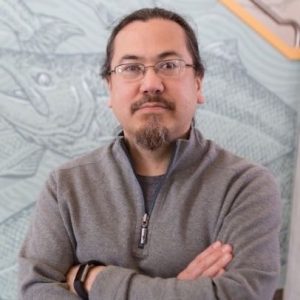Tribal Compacting Education in Alaska

By Joe Nelson, University of Alaska Southeast Vice Chancellor of Enrollment Management
In meeting Alaska’s Education Challenge, our public education system must embrace cultural diversity as an asset. Eyak was the first language of my grandparents, Galushia and Annie Nelson. Today, there are no Native Eyak speakers. The language is extinct. Alaska’s educational system accomplished its objective with respect to this tiny tribe – most of Annie and Galushia’s grandchildren and great-grandchildren are English speaking productive members of society. Fortunately, the system failed to extinguish the remaining 19 languages spoken among Alaska’s 229 federally recognized tribes.
The diversity among Alaska Natives is undeniable. A successful educational system will not only account for these cultural distinctions; it will ensure that these distinctions serve as the foundation of the local education in every community. That is the definition of relevant education. The content and delivery of public education must be tied to the cultures and histories of communities they serve. Now that most of our public policies are no longer explicitly attacking indigenous languages and cultures, we should embrace Tribal compacting as one of the solutions to Alaska’s Education Challenge.
Joe Nelson (second from right) discusses Tribal Compacting with (from left) Marlene Johnson of Hoonah, Willie Kasayalie of Akiachak, and Ivan Ivan of Akiak at a Native Issues Forum in Juneau.
On February 15, 2018, I had the good fortune of participating in a discussion about Tribal Compacting of Education with three icons in our communities at the Native Issues Forum hosted by the Central Council of Tlingit and Haida Indians. Marlene Johnson of Hoonah, Willie Kasayalie of Akiachak and Ivan Ivan of Akiak have been championing Native Education for decades. We had just a few minutes to identify pros, cons, and or concerns. For the most part, I was just the scribe, attempting to absorb some of their wisdom. Here are a few highlights from our conversation:
Pros:
- Preservation and perpetuation of our Native languages and cultures
- Education is the strongest tool we have to defeat negative hidden issues (e.g., suicide, alcoholism, addiction, etc.)
- Solutions come from within
- Respect is foundational in all of our Alaska Native cultures. Shared Native values.
- Thousands of years of knowledge. Elders in classrooms.
- Better informed decisions, local decision-making.
- Self-determination
- More holistic, more collective
- The environment is our classroom.
I did not get a chance to read all of the other ideas generated at the dialog event, but I am sure that the pros outweighed the cons. One thing that most agree on by accepting the Education Challenge is that the status quo is not an option. The system is working for some so that we can anticipate a few champions of the status quo, but the system clearly is not working for everyone.
Tribes that have the will and capacity to take on the Education Challenge should be afforded the opportunity. Most traditional communities approach the world through a holistic lens. They understand that relationships matter and real learning does not take place in a vacuum or within single disciplines.
In tribal communities, it is difficult to ensure community health when the compulsory educational system is built on totally competing values that promote individual achievement, individual rights, independence, and selfish competition all in pursuit of individual success. Most traditional education focuses on being a real human being by understanding and appreciating relationships and responsibilities within a larger group that is rooted in a specific place.
It is no wonder that so many people of color struggle in our education system when the system rewards behaviors and beliefs that are discouraged in traditional educational systems. I support the tribal compacting option because it is the most direct path to truly transforming our educational system in many of our communities. I support the tribal compacting option because tribal education is inherently focused on our shared history in this place, our collective identity, and the health of generations to come.
# # #
The views expressed here are the writer’s and are not necessarily endorsed by the Association of Alaska School Boards. AASB welcomes diverse perspectives and civil discourse. To submit a Guest Column for consideration, see our Guest Column Guidelines and email your 400-1000 word submission HERE.

